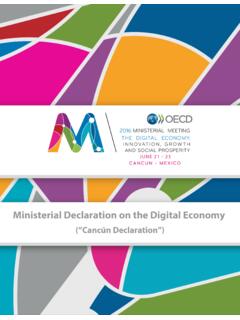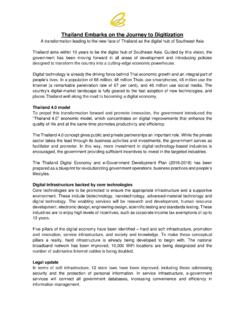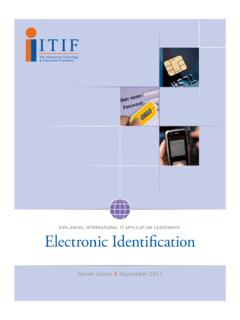Transcription of TOWARDS THE www.oecd.org/ieconomy IMPLEMENTATION …
1 @ prepared at the request of the 2017 G20 German PresidencyTOWARDS THE IMPLEMENTATION OF THE G20 ROADMAP FOR DIGITALISATION: SKILLS, BUSINESS DYNAMICS AND COMPETITIONThis report is issued under the responsibility of the Secretary-General of the OECD. This report was prepared by the Secretariat at the request of the G20 German Presidency as input to further work of the G20 digital Economy Task Force. The opinions expressed and arguments employed herein do not necessarily reflect the official views of OECD Member countries or of the G20.
2 The statistical data for Israel are supplied by and under the responsibility of the relevant Israeli authorities. The use of such data by the OECD is without prejudice to the status of the Golan Heights, East Jerusalem and Israeli settlements in the West Bank under the terms of international law. This report and any map included herein are without prejudice to the status of or sovereignty over any territory, to the delimitation of international frontiers and boundaries and to the name of any territory, city or area.
3 2018 TOWARDS THE IMPLEMENTATION OF THE G20 ROADMAP FOR DIGITALISATION OECD, 2018 3 FOREWORD In 2017, in D sseldorf, G20 Ministers responsible for the digital economy agreed to a forward-looking work plan for the G20 on the digital transformation and jointly adopted A Roadmap for Digitalisation: Policies for a digital Future (the Roadmap ) as part of the G20 digital Economy Ministerial Declaration ("D sseldorf Declaration"). In Hamburg, G20 leaders laid out their actions to support sharing the benefits of globalisation ("G20 Leaders' Declaration: Shaping an Interconnected World"), where leaders stated that the G20 Roadmap for Digitalisation will help guide future work to harness digitalisation.
4 The Roadmap was an important step TOWARDS action, building upon recent discussions in the G20 that had identified the digital economy as a critical policy area for G20 countries to address. Notably, in Antalya in 2015, G20 leaders observed that we are living in a digital age and that the effective use of digital technologies is an important driver for efficiency-enhancing and economic structural optimisation. In Hangzhou in 2016, G20 countries agreed to the G20 digital Economy Development and Cooperation Initiative, which proposed some common principles and key areas of development and cooperation for the digital economy.
5 The Roadmap identifies 11 policy areas as focal points for action, ranging from improving access and adoption of digital technologies, to expanding infrastructure and supporting SMEs, to enhancing trust in the digital era. The selection of these policy areas was informed by the OECD study Key Issues for digital Transformation in the G20, which was presented at a joint G20 Presidency OECD conference in Berlin on 12 January 2017 and served to inform the debate within the digital Economy Task Force under the German Presidency.
6 In order to support G20 countries in their efforts to implement the Roadmap, at the request of the 2017 G20 German Presidency, the OECD has produced this report, which focuses on three key areas for policy action identified in the Roadmap. The overall purpose of the work is to strengthen the evidence base in support of G20 discussions on these critical policy areas and to help inform future policy actions. The first chapter focuses on Action 7 of the Roadmap: Enable all people to adapt to and excel in the digital economy and society.
7 It sheds light on how the digital transformation is changing the demand for skills, and what role digitalisation and skills formation can play in narrowing the gender wage gap. It also shows the extent to which rewards (or returns to skills) differ depending on the extent to which industries have been penetrated by digital technologies, and offers evidence about the extent to which returns to skills differ by gender. This analysis provides concrete elements to support the designing and promotion of effective strategies across G20 countries on digital literacy and skills development for the digital economy and could help guide any desired collective action to address the transition from current to future skills and training needs.
8 The analysis in the second and the third chapters aims at supporting the IMPLEMENTATION of Action 4 of the Roadmap: Foster competition in the digital economy , which also noted the possibility to consider reviewing the OECD Competition Assessment Toolkit in light of digitalisation . To support G20 countries in shaping effective policies to follow-up and implement their commitment, Chapter 2 looks at the evolution of business dynamics and competition across industries and countries, and its relation to the degree of digital intensity of the industries in which firms operate.
9 By contributing to the evidence base, it aims to inform G20 discussions on how best to promote favourable conditions for the development of the digital economy and foster entrepreneurship, investment and innovation through effective contestability of markets. Chapter 3 then summarises a survey of national and local regulatory policies that affect digitalisation, with a view to informing discussions on how regulatory structures may need to evolve over time, taking account of technical conditions and policy priorities.
10 TOWARDS THE IMPLEMENTATION OF THE G20 ROADMAP FOR DIGITALISATION 4 OECD, 2018 ACKNOWLEDGEMENTS TOWARDS the IMPLEMENTATION of the G20 Roadmap for Digitalisation: Skills, business dynamics and competition was prepared by staff in the OECD Directorate for Science, Technology and Innovation (STI) and the Directorate for Financial and Enterprise Affairs (DAF). The work was co-ordinated by Sarah Box and Raffaella Centurelli from the OECD STI Directors Office, headed by Director Andrew Wyckoff and Deputy Director Dirk Pilat.














